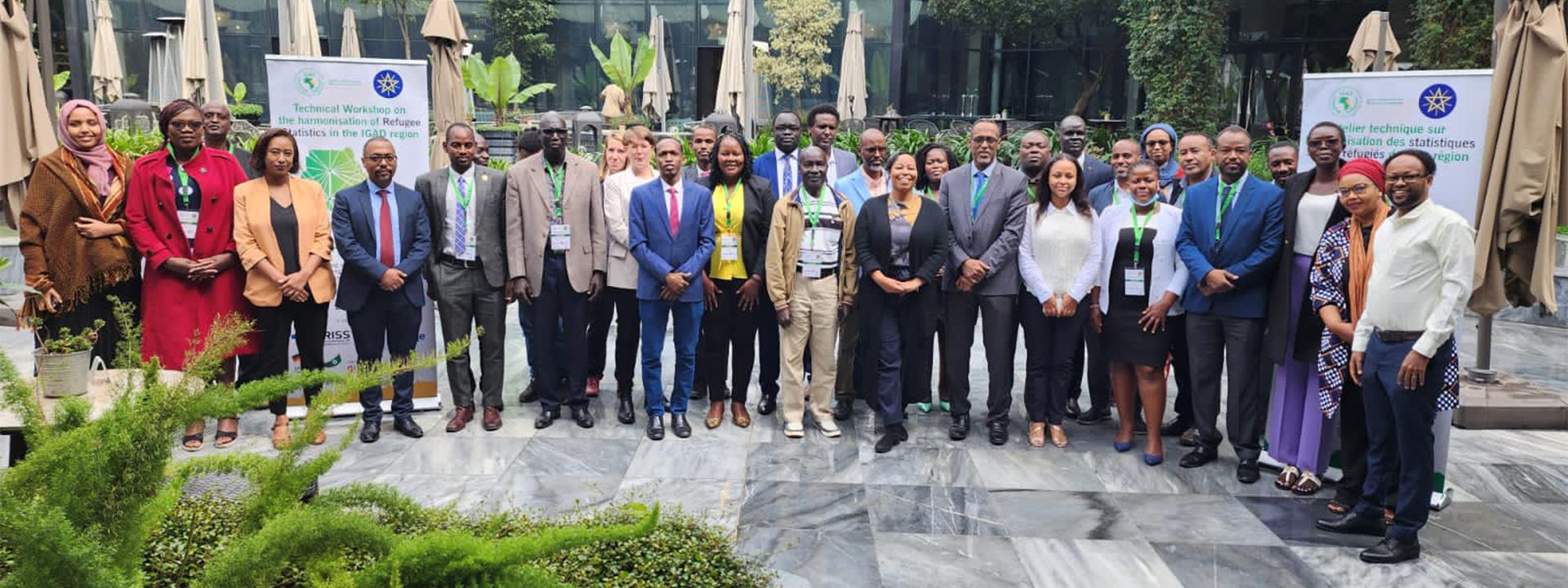July 26, 2023 (ADDIS ABABA, Ethiopia): IGAD Member States supported by the IGAD secretariat successfully concluded a three-day workshop focused on harmonizing refugee statistics in the IGAD region. The workshop aimed to determine the current status of official refugee and asylum seekers’ statistics across member states and share experiences on protocols for exchanging refugee data and statistics.
At the workshop that took place in Addis Ababa, Ethiopia, from July 24th to 26th, 2023, refugee commissions and National Statistics Offices across the IGAD region gathered to share their experiences handling refugee data and ensure they complied with data protection principles. They acknowledged the vulnerability of individual asylum applicants and aimed to improve the availability and quality of migration and forced displacement statistics in the IGAD region.
The workshop recognized the immense value of administrative data sources in statistical production across various domains. This significance becomes even more pronounced in supporting countries to fulfil their commitment to the ‘leave no one behind’ goal within the context of Agenda 2030. Governments and service providers routinely collect administrative data, which has evolved into a fundamental source for generating official statistics. Hence, the workshop was timely in enhancing the capacity of national statistical systems to utilize administrative data for statistical purposes.
Mme Fathia Alwan, the Director of Health and Social Development at IGAD, underlined the current efforts for the Secretariat to harmonize refugee data in the region. In her remarks, delivered by Ms. Teresa Diing, IGAD’s Capacity Building Officer in Refugee Protection and Asylum Law, Mme Alwan emphasized IGAD’s commitment to assisting its Member States in integrating refugee data collected within their borders into their national systems. This integration would facilitate access to crucial assistance, services, and sustainable solutions for refugees.
Furthermore, IGAD expressed its dedication to developing harmonized and standardized definitions, variables, and concepts in refugee data collection. This approach would enable easy disaggregation of data, aiding in efficient planning, policymaking, and coordination throughout the region. The alignment of these efforts with the objectives of the Global Compact on Migration (GCM) and the Global Compact on Refugees (GCR) was underscored. Notably, these objectives emphasize the importance of accurate and disaggregated data as the foundation for evidence-based policies that effectively address the needs and challenges of refugees.
The GIZ representative, Ms Kokebe Hailegabriel, on behalf of the German Federal Ministry of Economic Cooperation and Development, noted the importance of refugee data for decision as well as policy-making purposes.
“IGAD has made significant progress in generating harmonized, high-quality and comparable migration data since the establishment of regional and national technical working groups on data and the recent inclusion of displacement data in this regional process is an important development.”
“I encourage all of us to build on past efforts to prepare for harmonized and quality datasets and to take the next step towards the comprehensive collection and utilization of these data for decision-making and policy-making purposes,” said Ms. Kokebe, who is also the Team Leader for the GIZ implemented support to Strengthening IGAD Migration Policy Implementation (SIMPI) Project. GIZ, through the IGAD Secretariat provides continuous support to IGAD Member States in the realization of quality data.
The workshop emphasized the need for member states to establish data protection legislation and create protocols and agreements for sharing data among stakeholders at the national level. Additionally, the workshop highlighted the importance of addressing coordination issues related to collecting, disseminating, and storing data and regularly updating refugee statistics instead of waiting for demand.
The workshop was also facilitated with support from the Government of Sweden’s support to IGAD’s initiatives towards a common regional mechanism for refugee management.

